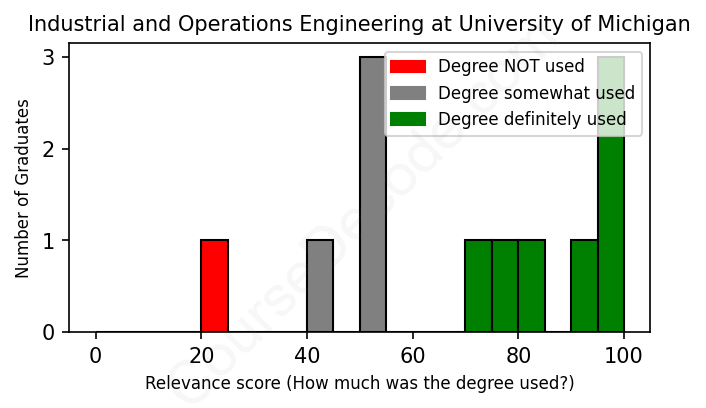
First, some facts. Of the Industrial and Operations Engineering graduates from University of Michigan we've analyzed , here's how many have used (or NOT used) their degree in their career:

These are estimates based on AI analysis of 12 LinkedIn profiles (see below).
The verdict? Slightly above average. Overall, with an average relevance score of 69%, Industrial and Operations Engineering graduates from University of Michigan have a slightly higher likelihood (+2%) of finding work in this field compared to the average graduate across all fields:
And for comparison, here's the chart for all profiles we've looked at across all degrees.
Also, after graduating, only 33% of these graduates have pursued further education other than another Bachelor's degree (such as a Masters degree or other), compared to the average across all profiles of 35%. This suggests a Bachelors degree is enough for most Industrial and Operations Engineering graduates, and it's normal to look for work straight after graduation.
See the details:
|
Relevance score: 96% We think this person has gone into a career highly relevant to their degree. We think this person has gone into a career highly relevant to their degree.
DEGREE INFOGraduated in 2016 from University of Michigan with a Bachelors Degree in Industrial and Operations Engineering. Also pursued further education since (see below). JOB HISTORY SINCE GRADUATIONTauber Intern, Material Movement Boeing May 2016 - Aug 2016 Industrial Engineer  Boeing Aug 2017 - May 2019 Operations Planning Manager  Zillow May 2019 - Nov 2020 Senior Program Design Manager  Zillow Nov 2020 - Feb 2021 Principal Program Design Manager  Zillow Feb 2021 - Present FURTHER DEGREES DONE SINCE GRADUATINGMasters DegreeUniversity of Michigan 2016 - 2017 ABOUTIm a strategic operations leader skilled in structuring new programs around the most ambiguous business challenges. Over the last 5 years Ive developed project and program management experience across agile startups and largest industry behemoths. Ive scaled programs from white paper to product roadmap to launch and on to expansion all with a dedication to building efficient products and processes that will last. Adept in navigating complex organizations to align stakeholders across products, shared services, and operations, my forte is unlocking talent through effective program design and management to execute on bold cross-functional strategies and big bets. Specific tools in my toolbox include: Smartsheet, SQL, data analysis, process design, workshop facilitation, risk management, and continuous improvement. |
The top 10 most common jobs done by the graduates we've analyzed (ranked most common to least) are:
When looking at the types of jobs that graduates from the University of Michigan with a degree in Industrial and Operations Engineering have landed, a few common themes emerge. Many of them have found themselves in roles like Industrial Engineer, Manufacturing Engineer, and various engineering consultant positions. These jobs tend to directly apply the principles of process optimization, supply chain management, and system design, which are core components of their academic background. For instance, positions like Ergo Engineer and Operations Planning Manager clearly leverage the engineering skills and methodologies learned during their studies. This shows that a significant portion of graduates is utilizing their degree in ways that align well with the industrial engineering field.
However, it's also worth noting that not all graduates have ended up in roles that fully utilize their training. Some have taken on positions in areas like software development, marketing, or financial analysis, which, while they might involve some analytical skills, don't heavily rely on the core engineering knowledge. For example, roles such as Applications Developer and Event Marketing Manager veer away from traditional industrial engineering applications. So, while many alumni are making effective use of their Industrial and Operations Engineering degree, there is a noticeable split where some have transitioned into positions that only tangentially relate to their field of study. Overall, it seems that there's a healthy mix, with plenty of relevant roles but a fair share of graduates finding their way into areas that are less aligned with industrial engineering despite their skills being valuable in a broader sense.
Here is a visual representation of the most common words in job titles for Industrial and Operations Engineering graduates (this is across all Industrial and Operations Engineering graduates we've analyzed, not just those who went to University of Michigan):

So, when you look at the career paths of folks who graduated with a degree in Industrial and Operations Engineering from the University of Michigan, it seems like they generally kick off their careers in roles that align pretty well with their studies. Most of them land first jobs in positions like process improvements, engineering, or analytics, often working for big names like General Motors, Boeing, or even in tech roles at companies like PwC and Disney. For a lot of them, those initial positions set the stage for their career trajectories, allowing them to quickly gain experience in areas like data analysis, manufacturing, and project management.
Fast forward five to ten years down the line, and many graduates are stepping into more senior roles, like program design managers, senior consultants, or decision science product managers. It’s clear that people are not just sticking with low-key positions; they’re moving into leadership and specialized roles within their companies, which is a great indicator of a solid career path. They also seem to maintain relevance to their field of study and take on roles that require significant analytical and engineering skills. Overall, it looks like graduates from this program are making good use of their degrees and finding success in careers that are directly related to Industrial and Operations Engineering, which is really encouraging for anyone considering pursuing this major!
Honestly, a Bachelor’s degree in Industrial and Operations Engineering (IOE) at the University of Michigan is pretty challenging, but it’s also super rewarding. You’ll dive into a mix of math, statistics, and problem-solving, along with some hands-on projects, which can definitely keep you on your toes. The coursework is designed to push you, and while it’s not as technical as some engineering fields like electrical or mechanical, it still requires a good amount of dedication and effort. It might be a bit harder than average because of the depth of analytical thinking and real-world applications involved, but if you’re passionate about optimizing processes and you’re willing to put in the work, it can also be a lot of fun!
Most commonly, in the LinkedIn profiles we've looked at, it takes people 4 years to finish a Bachelor degree in Industrial and Operations Engineering.
Looking at the career trajectories of these Industrial and Operations Engineering grads from the University of Michigan, it seems like they've generally landed some solid jobs that likely pay decent money. For instance, many of them are now in roles at big companies like Disney, Boeing, and General Motors where salaries tend to be pretty good, especially for graduates from a respected school like UM. Even their early roles as interns and entry-level engineers set them up well for advancement—many have moved quickly into managerial or specialized positions, which typically come with better pay. So, while exact figures are hard to pin down without salary data, it's fair to say they’re probably doing quite well on the financial front.
Here is a visual representation of the most common words seen in the "about" section of LinkedIn profiles who have a Bachelor degree in Industrial and Operations Engineering (this is across all Industrial and Operations Engineering graduates we've analyzed, not just those who went to University of Michigan). This may or may not be useful:

Here are all colleges offering a Bachelor degree in Industrial and Operations Engineering (ordered by the average relevance score of their Industrial and Operations Engineering graduates, best to worst) where we have analyzed at least 10 of their graduates:
| College | Score | Count |
|---|---|---|
 University of Michigan University of Michigan
|
69 | 12 |